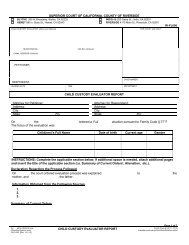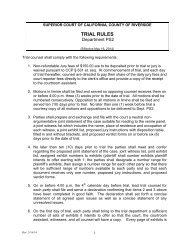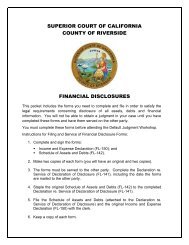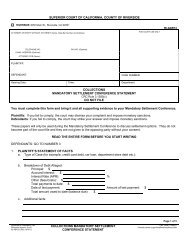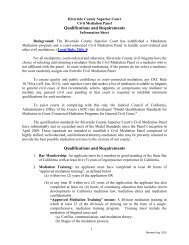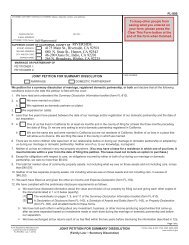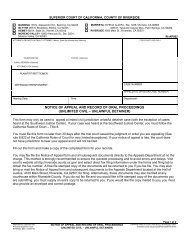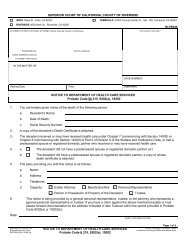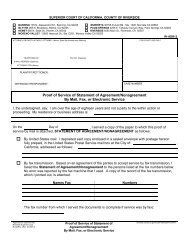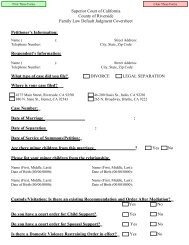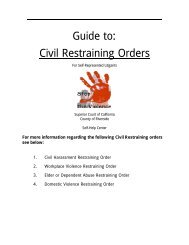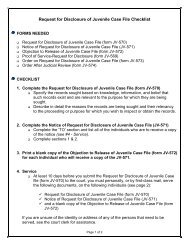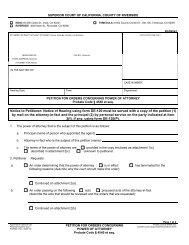Request for Domestic Violence Restraining Order (without Children)
Request for Domestic Violence Restraining Order (without Children)
Request for Domestic Violence Restraining Order (without Children)
You also want an ePaper? Increase the reach of your titles
YUMPU automatically turns print PDFs into web optimized ePapers that Google loves.
DV-200-INFO<br />
What Is “Proof of Personal Service”<br />
What is “service”<br />
Service is the act of giving your legal papers to the other person. There<br />
are many kinds of service—in person, by mail, and others. This <strong>for</strong>m is<br />
about personal or “in-person” service. The Notice of Court Hearing<br />
(Form DV-109), <strong>Request</strong> <strong>for</strong> <strong>Domestic</strong> <strong>Violence</strong> <strong>Restraining</strong> <strong>Order</strong><br />
(Form DV-100) and Temporary <strong>Restraining</strong> <strong>Order</strong> (Form DV-110)<br />
must be served “in person.” That means someone—not you or anyone<br />
else protected by the order—must personally “serve” (give) the person<br />
to be restrained a copy of the <strong>for</strong>ms. You cannot send them by mail.<br />
Service lets the other person know:<br />
• What orders you are asking <strong>for</strong><br />
• The hearing date<br />
• How to respond<br />
Why do I have to get the orders served<br />
• The police cannot arrest anyone <strong>for</strong> violating an order unless the restrained person knows about the order.<br />
• The judge cannot make the orders permanent unless the restrained person was served.<br />
Who can serve<br />
Ask someone you know, a process server, or a law en<strong>for</strong>cement agency (<strong>for</strong><br />
example, a sheriff) to personally serve (give) a copy of the orders to the person to<br />
be restrained. You cannot send the <strong>for</strong>ms to that person by mail.<br />
The server must:<br />
• Be 18 years of age or over<br />
• Not be you or anyone to be protected by the orders<br />
Don’t serve it by mail!<br />
A sheriff can serve the order at no cost to you.<br />
A “registered process server” is a business you pay to deliver court <strong>for</strong>ms.<br />
Look <strong>for</strong> “Process Serving” in the Yellow Pages or on the Internet.<br />
(If a law en<strong>for</strong>cement agency or the process server uses a different Proof of<br />
Service <strong>for</strong>m, make sure it lists the <strong>for</strong>ms served.)<br />
How to Serve<br />
Ask the server to:<br />
• Walk up to the person to be served.<br />
• Make sure it’s the right person. Ask the person’s name.<br />
• Give the person copies of all papers checked on Form DV-200,<br />
Proof of Personal Service.<br />
• Fill out and sign Form DV-200.<br />
• Give the signed Form DV-200 to you.<br />
What if the person won’t take the papers or tears<br />
them up<br />
• If the person won’t take the papers, just leave them near him or her.<br />
• It doesn’t matter if the person tears them up.<br />
Judicial Council of Cali<strong>for</strong>nia, www.courts.ca.gov<br />
Revised January 1, 2012<br />
What Is “Proof of Personal Service”<br />
(<strong>Domestic</strong> <strong>Violence</strong> Prevention)<br />
DV-200-INFO, Page 1 of 2



